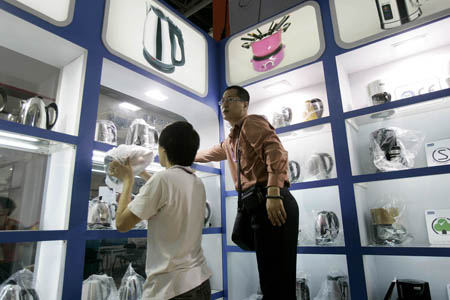The country's largest trading expo, China Import and Export Fair, is shifting its focus to the domestic market as demand in the overseas markets has shrunk and exports have declined for five months in a row.

Exhibitors readying their booth for the Canton Fair. [CFP]
|
The country's largest trading expo, China Import and Export Fair, is shifting its focus to the domestic market as demand in the overseas markets has shrunk and exports have declined for five months in a row.
Exhibitors, who normally target foreign buyers, have been invited to showcase their products for the domestic market, said Mu Xinhai, spokesman for China Import and Export Fair, also known as the Canton Fair.
The 105th session of the fair, which starts in Guangzhou today, has also managed to get domestic buyers, including businessmen from large shopping malls, chain stores, and wholesale markets to participate in the fair, said Mu.
He said the fair, which normally has three phases, would devote a day from both the second and the third phases specifically for dealers from the domestic market to do business.
The Canton Fair, established in 1952, was mainly organized to showcase Chinese products to overseas buyers. But it has reinvented itself as some exporters have shifted their focus to the domestic market as many of the erstwhile global trading partners have slipped into a recession.
"The financial crisis has shown that if an enterprise does not have a good foundation in the domestic market, it will be hard for them to be strong in exports," said Wen Zhongliang, an official with the Ministry of Commerce.
China's exports have declined five months in a row. Exports declined 17.1 percent in March, after a sharp drop of 25.7 percent in February.
According to Mu, the number of exhibitors at the event has decreased slightly, but the overall scale of the fair still remains the same. Sources, however, maintain that there would be a decline in the foreign participation at the fair.
The Guangzhou Hotels' Association had earlier said room rates in the city would be 20 percent lower this time than previous years due to a decline in reservations.